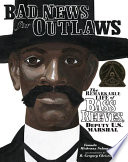SHOWDOWN Indian Territory, 1884
Jim Webb’s luck was running muddy when Bass Reeves rode into town. Webb had stayed one jump ahead of the lawman for two years. He wasn’t about to be caught now. Packing both rifle and revolver, the desperado leaped out a window of Bywaters’ store. He made a break for his horse, but Reeves cut him off. Bass hollered from the saddle of his stallion, warning Webb to give up.
The outlaw bolted.
Bass shook his head. He hated bloodshed, but Webb might need killing. As a deputy U.S. marshal, it was Bass’s job to bring Webb in. Alive or dead. Bass had put Webb behind bars before, but the outlaw was back on the run. That would end today.
Webb couldn’t outrun a horse. And knew he’d hang for sure this time. In a last-ditch effort to escape, Webb stopped in his tracks, turned, and let loose with his rifle.
Webb’s first shot grazed Bass’s saddle horn. His second shot cut a button from the lawman’s coat. Webb’s third tore the reins right out of Bass’s hands. Bass ducked his head, dove off his horse, and rolled to his feet just as a fourth bullet clipped his hat brim.
That was Jim Webb’s last shot. Ever. Marshal Reeves fired two rounds from his Winchester rifle, and the outlaw was done for.
As he lay dying, Webb told Bass, “You are a brave, brave man…. I have killed eleven men. . . and I expected to make you the twelfth.”
Webb gave Bass his revolver out of respect. Bass buried Webb’s body and turned in the outlaw’s boots and gun belt as proof he’d gotten his man.
Being a peace officer in Indian Territory was rough and dangerous. The area swarmed with horse thieves, train robbers, cattle rustlers, and gunslingers. Bandits, swindlers, and murderers thrived. Travelers sometimes disappeared, never to be heard from again. A lawman’s career could be short-and end bloody. So Bass Reeves had a big job. And it suited him right down to the ground. Everything about him was big.
Bass stood a head taller than most men of his time. He had broad shoulders and huge hands. Bass was so strong, he single-handedly pulled a steer out of mud up to its neck while a bunch of slack-jawed cowpokes stood speechless.
Bass sported a large, bushy mustache and wore a wide brimmed black hat. He rode tall, powerful horses.
But the biggest thing about Bass Reeves was his character. He had a dedication to duty few men could match. He didn’t have a speck of fear in him. And he was as honest as the day is long.
SLAVE DAYS
1840s-1860s
Bass spent most of his early years as a slave in Texas. Even as a youngster, his star shone bright. Bass was sharp witted and good-natured. People liked his pluck. He had a special way with animals, especially horses. Bass tended livestock and fetched water for the field hands. While he worked, Bass sang. He sang about pistols and rifles and knives. He sang of bandits and killers and thieves.
His mother feared her boy might go bad. She couldn’t have been more wrong. Bass took to guns like a bear to honey, but he always handled them with respect. He grew up smart and decent and had nothing but right in his heart.
His owner, Colonel George Reeves, took Bass hunting and entered him in shooting contests. He liked showing Bass off. Bass impressed his owner so much the colonel took him along when he went to fight in the Civil War.
But one night, something happened that changed everything for Bass. Folks say the two men argued during a card game, and Bass struck his owner. For a slave, this meant certain death. Bass made tracks for Indian Territory.
FREEDOM and FAMILY
Late 1860s-1874
Only Native Americans were supposed to live in Indian Territory. but some Indians accepted blacks. Bass lived within the tribes, learned their languages, and perfected his marksmanship. As he roamed the frontier, Bass felt a freedom he’d never known. Still, as a runaway slave, Bass had to keep on the dodge.
Finally, the Civil War ended, and the slaves were free.
It was safe for Bass to settle down. He bought a spread in Arkansas, just outside Indian Territory, and married a pretty woman named Jennie. True to the song of his life, Bass had a big family. He and Jennie and their eleven children worked the land and raised hardy livestock.
Bass’s life was good, but times were hard for folks in Indian Territory. The vastness of this wild country offered countless places for bad men to hide. The territory became a haven for the West’s most notorious outlaws. Settlers in Indian Territory had had enough. Even though most were squatters who had put down stakes illegally, they still wanted protection.
Comprehension Questions
1. What changed for Bass to live within the Native Americans?
A. His owner struck him.
B. He decided he wanted something new.
C. He struck his owner.
A. The Civil War ended
B. The Vietnam war ended
C. He finally felt safe
Your Thoughts
Vocabulary
4. List any vocabulary words below.

